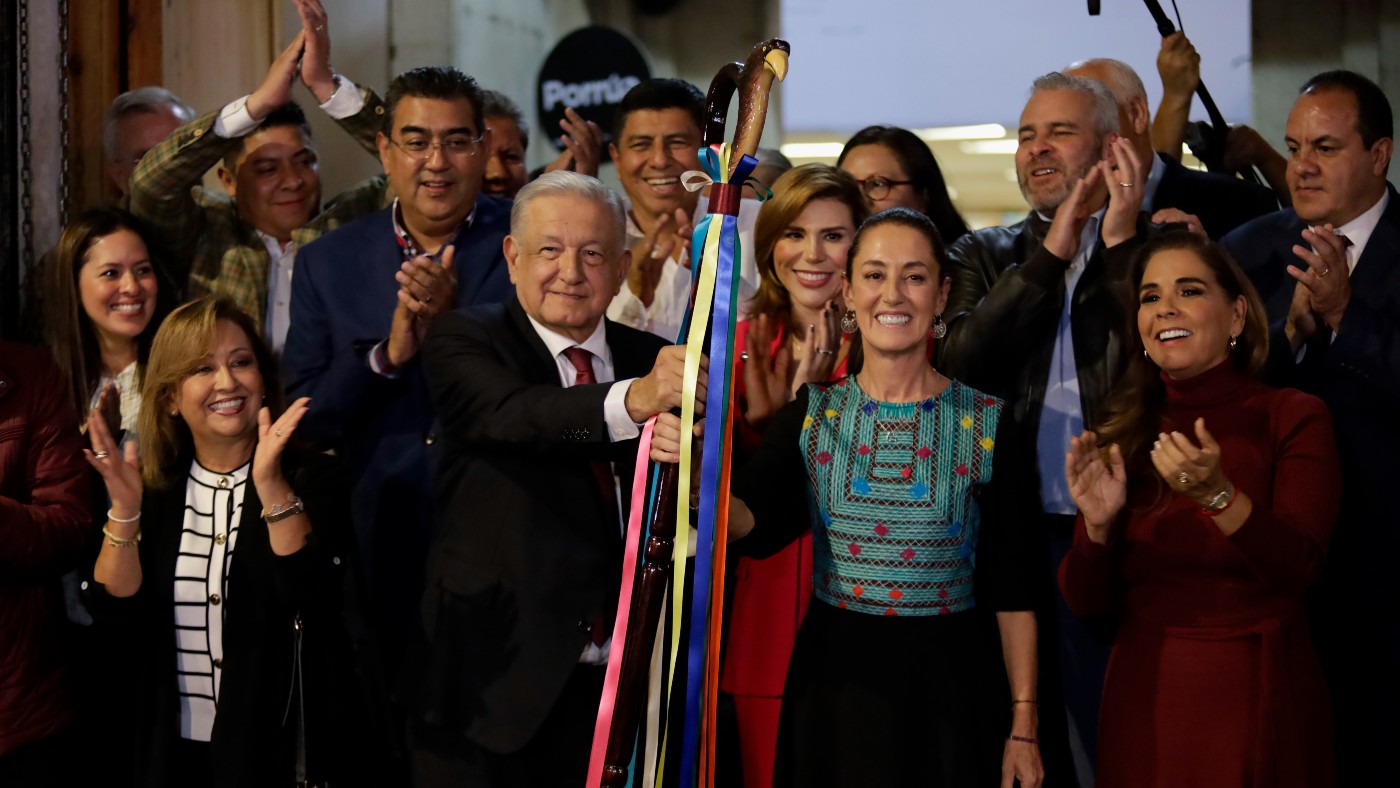What Mexico’s first female president might mean for the ‘femicide nation’
The Latin American country is grappling with misogynist crime amid a backdrop of progress for women in politics

A free daily email with the biggest news stories of the day – and the best features from TheWeek.com
You are now subscribed
Your newsletter sign-up was successful
Barring any surprises, Mexico will elect its first ever female president next year.
Claudia Sheinbaum, the “climate-scientist-turned-politician” who served as mayor of Mexico City, has been selected ahead of five male rivals as the candidate of the governing left-wing Morena party, said The Guardian.
She will be challenged by Xóchitl Gálvez, who “has seized media attention with her aspirational story of growing up with an Indigenous father and mestizo mother in Hidalgo state, before working her way through public university and into business and politics”.
The Week
Escape your echo chamber. Get the facts behind the news, plus analysis from multiple perspectives.

Sign up for The Week's Free Newsletters
From our morning news briefing to a weekly Good News Newsletter, get the best of The Week delivered directly to your inbox.
From our morning news briefing to a weekly Good News Newsletter, get the best of The Week delivered directly to your inbox.
Mexico is a “traditionally macho nation”, said The Washington Post. But both candidates have emphasised their sex while campaigning. Sheinbaum uses the hashtag #EsTiempodeMujeres, meaning “this is women’s time”, and told Gatopardo that “girls see an example in me”. Gálvez says she rebelled against her abusive father to pursue education, and when a man tried to rape her when she was 17 she fought back with a soldering iron.
Violence against women has been rising. “In Mexico, some 10 women and girls are killed every day by intimate partners or other family members,” according to the UN. Women have been “dying at a frightening pace”, The Associated Press reported, a result of “cultural machismo, systemic gender inequality and latent domestic violence”. Even when crimes are punished, many view sentences as too lenient.
The current president, Andrés Manuel López Obrador, has faced criticism for his inability to stop Mexico becoming a “femicide nation”, The Guardian reported last year.
And in August he “sparked ridicule and outrage” when he responded to more questions on the subject by suggesting that he too could be the victim of gender-based violence. “Everything they say to me, isn’t that gender-based violence?” López Obrador said. “Or is gender only female?”
A free daily email with the biggest news stories of the day – and the best features from TheWeek.com
Sheinbaum and Gálvez have put women’s rights at the forefront of their respective agendas. And the feminist movement has already brought about change. Last week the Supreme Court, which in January elected its first female president, legalised abortion, stating the “denial of the possibility of a termination violated the human rights of women”. The majority of senators are now women and the central bank governor is female.
“It’s not quite Barbie Land,” said The Washington Post, “but the progress is remarkable in a country where women couldn’t even vote until 1953.”
Next June’s election is “a feminist’s dream”, Mexican women’s rights activist Maricruz Ocampo told the newspaper. It “is going to signify a turn in the way that we see women in politics”.
Many women in Mexico, who make up 52% of the population, “hope the government that takes office in October 2024 will empower them as never before”, said Reuters.
Others are more cautiously optimistic. “They’re not magical unicorns; they don’t have magic wands,” Jennifer Piscopo, professor of gender and politics at the University of London, told The Washington Post. “They’re not going to fix centuries of discrimination against women overnight.”
Rebekah Evans joined The Week as newsletter editor in 2023 and has written on subjects ranging from Ukraine and Afghanistan to fast fashion and "brotox". She started her career at Reach plc, where she cut her teeth on news, before pivoting into personal finance at the height of the pandemic and cost-of-living crisis. Social affairs is another of her passions, and she has interviewed people from across the world and from all walks of life. Rebekah completed an NCTJ with the Press Association and has written for publications including The Guardian, The Week magazine, the Press Association and local newspapers.
-
 How the FCC’s ‘equal time’ rule works
How the FCC’s ‘equal time’ rule worksIn the Spotlight The law is at the heart of the Colbert-CBS conflict
-
 What is the endgame in the DHS shutdown?
What is the endgame in the DHS shutdown?Today’s Big Question Democrats want to rein in ICE’s immigration crackdown
-
 ‘Poor time management isn’t just an inconvenience’
‘Poor time management isn’t just an inconvenience’Instant Opinion Opinion, comment and editorials of the day
-
 Epstein files topple law CEO, roil UK government
Epstein files topple law CEO, roil UK governmentSpeed Read Peter Mandelson, Britain’s former ambassador to the US, is caught up in the scandal
-
 Mexico’s vape ban has led to a cartel-controlled black market
Mexico’s vape ban has led to a cartel-controlled black marketUnder the Radar Cartels have expanded their power over the sale of illicit tobacco
-
 Iran and US prepare to meet after skirmishes
Iran and US prepare to meet after skirmishesSpeed Read The incident comes amid heightened tensions in the Middle East
-
 Israel retrieves final hostage’s body from Gaza
Israel retrieves final hostage’s body from GazaSpeed Read The 24-year-old police officer was killed during the initial Hamas attack
-
 China’s Xi targets top general in growing purge
China’s Xi targets top general in growing purgeSpeed Read Zhang Youxia is being investigated over ‘grave violations’ of the law
-
 Panama and Canada are negotiating over a crucial copper mine
Panama and Canada are negotiating over a crucial copper mineIn the Spotlight Panama is set to make a final decision on the mine this summer
-
 Why Greenland’s natural resources are nearly impossible to mine
Why Greenland’s natural resources are nearly impossible to mineThe Explainer The country’s natural landscape makes the task extremely difficult
-
 Iran cuts internet as protests escalate
Iran cuts internet as protests escalateSpeed Reada Government buildings across the country have been set on fire